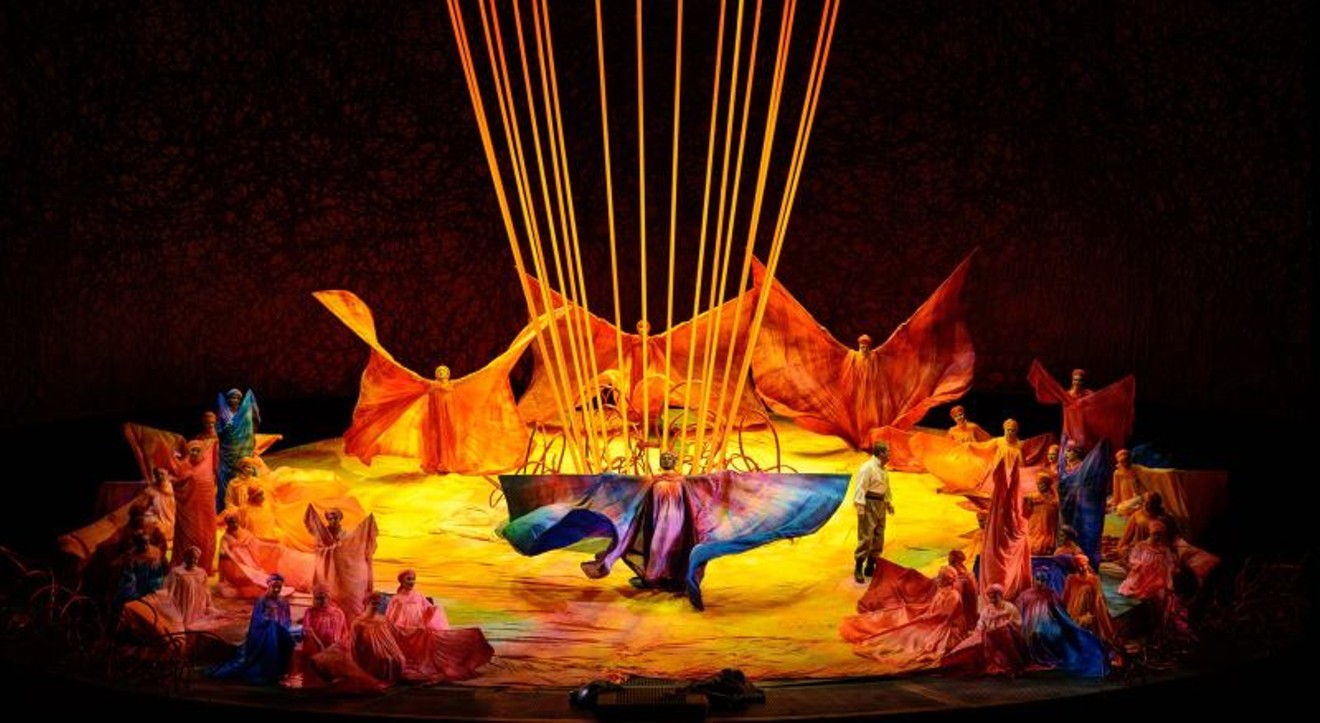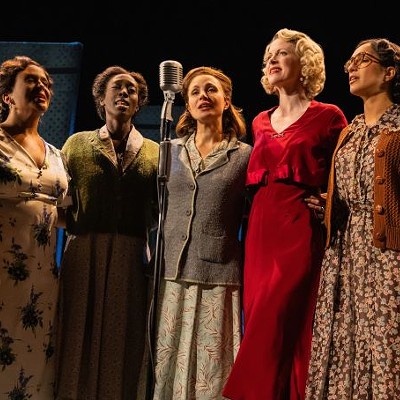Support Us
Houston's independent source of
local news and culture
account
- Welcome,
Insider - Login
- My Account
- My Newsletters
- Contribute
- Contact Us
- Sign out
Parsifal Weaves its Own Lengthy Musical Magic at Houston Grand Opera
D. L. Groover January 20, 2024 8:58AM

Parsifal a long dip into mythology with rewarding music by Wagner throughout.
Photo by Robert Kusel
[
{
"name": "Related Stories / Support Us Combo",
"component": "11591218",
"insertPoint": "4",
"requiredCountToDisplay": "4"
},{
"name": "Air - Billboard - Inline Content",
"component": "11591214",
"insertPoint": "2/3",
"requiredCountToDisplay": "7"
},{
"name": "R1 - Beta - Mobile Only",
"component": "12287027",
"insertPoint": "8",
"requiredCountToDisplay": "8"
},{
"name": "Air - MediumRectangle - Inline Content - Mobile Display Size 2",
"component": "11591215",
"insertPoint": "12",
"requiredCountToDisplay": "12"
},{
"name": "Air - MediumRectangle - Inline Content - Mobile Display Size 2",
"component": "11591215",
"insertPoint": "4th",
"startingPoint": "16",
"requiredCountToDisplay": "12"
}
]
I don't think I'm too far off the mark to say that Parsifal (1882), Richard Wagner's final opera, is on no one's list of most favorite Wagner works. While it contains some of his most sublime music, nearly transcendent you could argue, the opera is a quasi-religious tract stuffed with Christian symbolism, Buddhist reincarnation, veganism, paganism, sorcery, respect for the natural world, and a never-ending diatribe on guilt.
Every character in some way suffers enormous pangs of guilt, great big tsunami waves of the stuff. They can't stop singing about it. With two intermissions, it takes about five hours for them to find redemption.
Parsifal thinks he has killed his mother when he wandered off into the forest as a young man. Amfortas, the king of the grail knights, has been seduced by Kundry, a big no-no for the chaste men of Monsalvat, and he has been pierced by the spear that wounded Christ on the cross, causing him a never-healing wound. In a previous incarnation, Kundry laughed at Christ in his final agonies, and has been eternally cursed. She has had many avatars over her eternal lifetime: Herodias, Hell's Rose, the Nameless One. She is a witch who can fly through space and time.
Evil sorcerer Klingsor, who now possesses the holy spear, was once a knight-to-be, but even after castrating himself to gain their favor, he was rejected and now rules the neighboring kingdom and gets his revenge by seducing the grail knights through his magic flower maidens. Gurnemanz, the opera's long-winded narrator of all previous travails suffered under this forest assemblage of noble knights who protect the grail and, once, the spear, longs for the anointed one, the holy fool, who will reclaim the spear and set their brotherhood right with the world.
Titurel, the former ancient king and father of Amfortas, will die if the grail isn't uncovered in their ceremony, which Amfortas refuses to do because of the unbearable pain the goblet's radiance causes him. It pierces through his sin. The guilt circles over these characters like a great stain.
This is all heady stuff, some blasphemous, some radiantly pure of heart, some lilting as a lullaby. Wagner called Parsifal a “sacred festival play,” and finagled his gracious benefactor King Ludwig II of Bavaria to secure the rights only for his own opera house in Bayreuth, keeping it in the family so to speak.
The ploy worked until the Metropolitan Opera in New York, through pirated copies of the score, presented it in 1903. At that time there was no international copyright law, so Wagner was forced to relinquish Parsifal to the world. It's always a rare instance when the opera is given, usually around Easter naturally, and Houston Grand Opera last performed this Aryan behemoth 33 years ago during their 1991-92 season.
Regardless of Wagner's bloviating libretto, the opera possesses an ethereal magical spell all its own due to its music. Wagner called it “cloud-like,” and it is. Some of it is so diaphanous, it floats away on subtle key changes and impressionistic orchestration; some of it is magisterial and august with blaring horns, pounding tympani, and distant church bells. It is certainly visceral, and there's no other sound in opera quite like it. It's the forerunner of Debussy and Ravel's limpid textures. For its time, it was the most modern music around.
There's great emotion to it, heartfelt and personal, as it delineates not only what the characters see around them, but what's going on inside them. The modulations and unresolved chord progressions perfectly capture the unsettling mood that hovers over all of them. Parsifal is the culmination of Wagner's own long-winded treatises on music for opera, his “gesamtkunstwerk,” or total art work where every element – design, music, words, expression – has its rightful place.
Listen to Act III's “Good Friday Spell,” an orchestral excerpt long favored by conductors. You can see through the soft melodies as the woodland blooms and glows under the magic of Good Friday – well, not so much in this production – but it's all there in the music. A tone painting of incomparable spring, fresh and dew-bespotted. This is Wagner at his most tender, most refined and subtle.
If you want your Parsifal to look like something out of Star Wars, this John Caird production will be catnip. With its steel-banded trees lit from within, industrial flooring, a Kabuki-inspired Klingsor, knights in Obi-Wan Kenobi great coats, Ninja minions who ape Klingsor's movements, flower maidens who've stepped out of a turn-of-last-century Loie Fuller routine, an aged Tinurel who looks like an Incan mummy from Cuzco, and gymnastic swans who swan about in the background with only one wing, then this is your show.
For those of us who just want great opera done with intelligence, not so much. I suppose the designers were going for a timeless look, a symbolic way to stage Wagner without resorting to heavy natural sets. (When you see photographs of the original Bayreuth production, you wonder how they ever put that on. It's so literal – a temple modeled after Siena's domed cathedral; a magic garden inspired by an Almalfi folly; a forest straight out of the Bavarian woods. Although state-of-the- art for its time, it's all a little too much Victoriana, puffed and padded.) It would have been great to look at, though, as compared to this tie-dyed, disco extravaganza.
When Klingsor's kingdom collapses as Parsifal makes the sign of the cross with the spear, the music tumbles in a grand heap but the red neon tubes of the magician's parapets remain frozen in place, as does Klingsor. Sure, the floor covering is swept away, but that's a poor excuse for the great coup de theatre Wagner demanded. He knew how to end an act.
You may want to close your eyes during most of this, but that of course induces sleep, which would be anathema for this HGO production with its magnificent singing. They must be heard, so no dozing. This wont be the first time that an opera is flawed in execution, but the sound is exemplary. It wont be the last, either, trust me.
Formerly heard in Houston, tenor Russell Thomas co-starred in HGO's 2021 Aida. As we said at the time, “...Thomas (Aida's closet lover, Radames) has the clarion sheen of immortal Richard Tucker and the silky smoothness of young Placido Domingo. His “Celeste Aida,” one of the most renowned and difficult tenor arias in the rep, was a masterclass of phrasing and musicality.” He has lost none of that. Parsifal, while not an exceptionally deep character, is, like any Wagnerian role, fraught with difficulty. While not a typical heldentenor part, it possesses passionate outbursts and smooth legato. Like Domingo and Jonas Kaufmann, both exemplary Wagnerians, Thomas uses Italianate phrasing to marshal through the thorny passages Wagner throws at him. He sounds silky, with flawless diction and effortless power.
Power and velvet is what dramatic soprano Elena Pankratova possesses in spades. Her Kundry, perhaps visually not the most alluring temptress, especially in that puce and magenta concoction the costumer has saddled her with, nevertheless seduces us with her rich and creamy voice. She navigates easily through the sonic highs and lows of Kundry's hellish predicament, and brings needed warmth and compassion to her later penitent. (She's also allowed a happy ending in this opera, instead of collapsing in death as intended. She canoodles with former lover Amfortas, now healed by the touch of the spear that wounded him, as Parsifal blesses the congregants. She's been through hell, why not give her a happy ending? Finally, a good choice by Caird, I'd say.)
Amfortas is sung by bass-baritone Ryan McKinny, who's always a pleasure to watch. A consummate actor, his sonorous voice is but a noble extension. Like all the others in this opera, his suffering goes on and on, but with his unmatched stage presence he is always watchable, as his deep voice is immensely listenable. He turns anguish into pleasure.
Making his HGO debut, bass Kwangchul Youn, as Gurnemanz, can return any time he likes. He has the unenviable task of leading us through the lengthy history lessons that Wagner writes. They are page turners, but Youn easily sails through them with keen foresight and dramatic acumen.
And then there's bass Andrea Silvestrelli, as evil Klingsor, who knows his way around an opera stage like it was his own magic garden. His commanding Hagan in HGO's Götterdämmerung (2017), Fafner in Das Rheingold (2014) and Siegfried (2016), his poignant Philippe II in Don Carlos (2012) or his exceedingly funny Osmin in Abduction from the Seraglio (2008) – he can do it all. Klingsor is just another feather in his crown.
Guiding these disparate forces as if second nature is maestro Eun Sun Kim, last heard here when she lavishly conducted Puccini's Turandot in Robert Wilson's frozen HGO staging (2022). She certainly knows her Wagner. Not one nuance went unsung in her dramatic reading. Layered and dense, the magic, the nature, the majesty were all there.
Parsifal is not to everyone's liking. It's long, can be tiresome, and Wagner was always in need of a good editor. But it is some sort of masterpiece, bloated as it is and filled with questionable material. But it is Wagner, and rare to see staged.
While we do not like how this one looked, the sound was unbeatable. Believe it or not, five hours went by smoothly, if not totally transformative. By the way, there's a special drink they're peddling at the bar, the Kundry Spritz. I didn't have one, but it sounds like a great idea. Five hours will seem like four.
Performances continue through February 4 at 6 p.m. Friday, Saturday and Wednesday; and 2 p.m. Sundays. Wortham Center, 501 Texas. Sung in German with projected English subtitles. For more information, call 713-228-6737 or visit houstongrandopera.org. $25-$280.
KEEP THE HOUSTON PRESS FREE...
Since we started the Houston Press, it has been defined as the free, independent voice of Houston, and we'd like to keep it that way. With local media under siege, it's more important than ever for us to rally support behind funding our local journalism. You can help by participating in our "I Support" program, allowing us to keep offering readers access to our incisive coverage of local news, food and culture with no paywalls.
D.L. Groover has contributed to countless reputable publications including the Houston Press since 2003. His theater criticism has earned him a national award from the Association of Alternative Newsmedia (AAN) as well as three statewide Lone Star Press Awards for the same. He's co-author of the irreverent appreciation, Skeletons from the Opera Closet (St. Martin's Press), now in its fourth printing.
Contact:
D. L. Groover
Trending Arts & Culture
- Reviews For The Easily Distracted:
The Fall Guy - The 10 Best And Most Controversial Hustler Magazine Covers Ever (NSFW)
- Top 5 Sickest Stephen King Sex Scenes (NSFW)
-
Sponsored Content From: [%sponsoredBy%]
[%title%]

Don't Miss Out
SIGN UP for the latest
arts & culture
news, free stuff and more!
Become a member to support the independent voice of Houston
and help keep the future of the Houston Press FREE
Use of this website constitutes acceptance of our
terms of use,
our cookies policy, and our
privacy policy
The Houston Press may earn a portion of sales from products & services purchased through links on our site from our
affiliate partners.
©2024
Houston Press, LP. All rights reserved.





